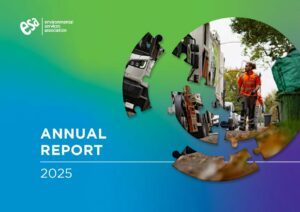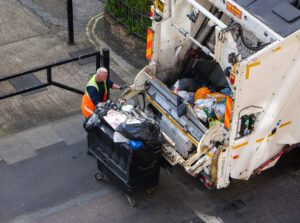ESA Chairman, Michael Topham, appeared alongside Steve Reed in London earlier this morning (Thursday 27th March) as the Defra Secretary of State set out Government’s Circular Economy ambitions.
Speaking to industry leaders from the Environmental Services Association alongside other British firms and trade associations at the Dock Shed in London, Environment Secretary Steve Reed set out how the government will provide the direction and certainty for businesses to plan and deliver the nation’s transition to a “truly circular and future-proof economy”. The Government hopes this will deliver growth and fundamentally shift consumers’ relationship with the goods they use every day – making reuse and repair the norm and ending the throwaway society.
Responding to the speech, ESA Executive Director, Jacob Hayler welcomed the announcement as “deeply encouraging” and said that regulatory reform would help the resources and waste sector deliver a more circular, resource-resilient, economy.
He said: “ESA members have invested billions in circular economy jobs and infrastructure over the past two decades, moving the UK from a throwaway society to one where we now recycle nearly half of everything we throw away – putting millions of tonnes of materials back into productive use each year. With the right regulatory interventions, delivered correctly and consistently, our industry stands poised to invest a further £10 billion in the UK’s low-carbon circular economy over the next five to ten years, as the Secretary of State recognised today.
These regulatory reforms include the long-awaited collection and packaging reforms, which the Secretary of State also recognised, as well as measures to stimulate markets for secondary raw materials and crack down on waste crime. Long-term policy clarity and the right targeted interventions will help our sector deliver the next generation of circular economy innovations at scale, and help our sector play our critical role in delivering Government’s binding recycling and resource-efficiency targets.
It is deeply encouraging that Defra, under a Labour Government, shares our vision for a circular economy, particularly in recognising the benefits of a more resource-resilient UK economy on a volatile world stage, where supply chains for critical materials are far from guaranteed. We look forward to working alongside the Circular Economy Taskforce to create roadmaps for the critical sectors outlined by the Steve Reed today, although we urge Defra to add batteries and electronics to the sectoral work programme as quickly as possible – since these items are highly susceptible to availability of critical raw materials; are essential to our everyday lives; and currently cause major waste management challenges when thrown away instead of being recycled.”




